BBC News:
"This assessment is based on intelligence, the weapons used, the level of expertise needed to execute the operation, recent similar Iranian attacks on shipping, and the fact that no proxy group operating in the area has the resources and proficiency to act with such a high degree of sophistication."
A UK government source said it agreed with the US assessment, according to BBC diplomatic correspondent James Landale.
•••••••••••••••••••••••••••
Most of the other comments were written by liberal fucktards. They hate Trump as do I. But they think the Trump administration is making things up. Their comments are ridiculous.
I have an online subscription to read the New York Times but I prefer the totally free BBC News. Here is the whole thing from BBC.
Gulf of Oman tanker attacks: Iran calls US accusation 'unfounded'
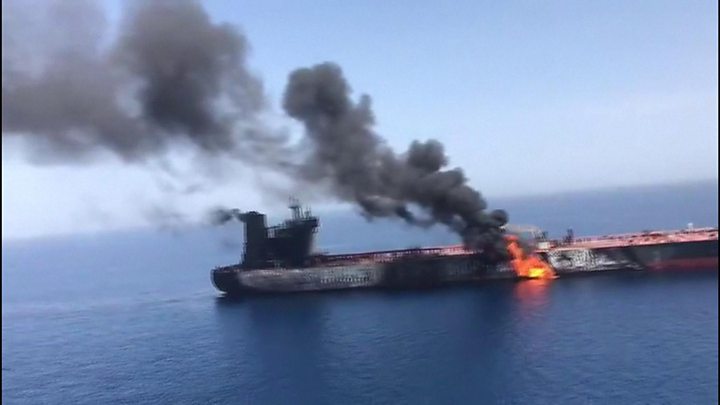
Iran says it "categorically rejects" US claims that it is behind attacks on two oil tankers in the Gulf of Oman.
US Secretary of State Mike Pompeo had blamed Iran for the "unprovoked attacks" on Thursday.
He added that the US had made its assessment based on intelligence about the type of weapons used.
But Iran dismissed the claim as "unfounded". A senior Iranian official had earlier told the BBC that "Iran has no connection" with the explosions.
Dozens of crew members were rescued after the blasts on the Japanese-owned Kokuka Courageous and the Front Altair, owned by a Norwegian company.
In a statement released on Friday, the Iranian mission to the United Nations said: "Iran categorically rejects the US unfounded claim with regard to 13 June oil tanker incidents, and condemns it in the strongest possible terms."
Within hours of the denial, the US military's Central Command released a video it says shows Iran's Revolutionary Guard "removing [an] unexploded limpet mine" from the side of the Kokuka Courageous following the blasts.
- Gulf of Oman tanker 'attacks': What we know
- Iran, the US and the Gulf: What now?
- US-Iran tensions explained
The blasts come a month after four oil tankers were damaged in an unclaimed attack off the United Arab Emirates. The US at the time blamed Iran - but Tehran denied the accusations.
Oil prices jumped as much as 4% after Thursday's incident in the Gulf of Oman, which lies at one end of a vital shipping lane through which hundreds of millions of dollars of oil pass.
BIMCO, the world's largest international shipping association, said the tension in the area are "now as high as it gets without being an actual armed conflict".
Meanwhile, UK Foreign Secretary Jeremy Hunt warned that if Iran was involved, "it is a deeply unwise escalation which poses a real danger to the prospects of peace and stability in the region".
What did Mike Pompeo say?
"It is the assessment of the United States that the Islamic Republic of Iran is responsible for the attacks," the US secretary of state said at a news conference in Washington.
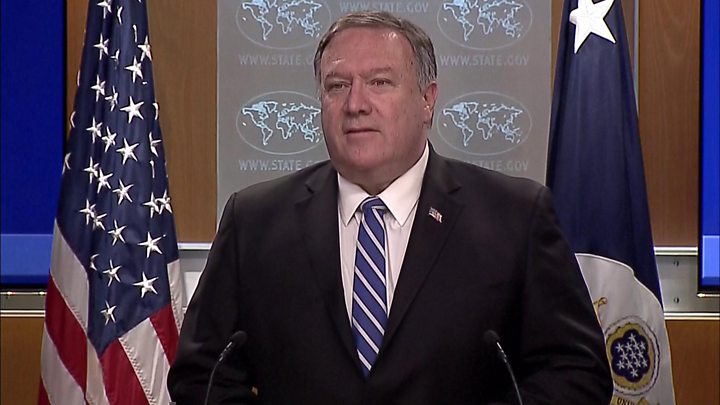
"This assessment is based on intelligence, the weapons used, the level of expertise needed to execute the operation, recent similar Iranian attacks on shipping, and the fact that no proxy group operating in the area has the resources and proficiency to act with such a high degree of sophistication."
Mr Pompeo presented no evidence.
"This is only the latest in the series of attacks instigated by the Islamic Republic of Iran and its surrogates against American and allied interests.
"Taken as a whole, these unprovoked attacks present a clear threat to international peace and security, a blatant assault on the freedom of navigation, and an unacceptable campaign of escalating tension by Iran," Mr Pompeo said.
What do we know about the explosions?
The Norwegian Maritime Authority said earlier on Thursday that the Front Altair had been "attacked", and that there were three blasts on board.
Wu I-fang, a spokesman for Taiwan's CPC Corp oil refiner, which chartered the Front Altair, said it was carrying 75,000 tonnes of naphtha and was "suspected of being hit by a torpedo", although this has not been confirmed.
Other unverified reports suggested a mine attack.
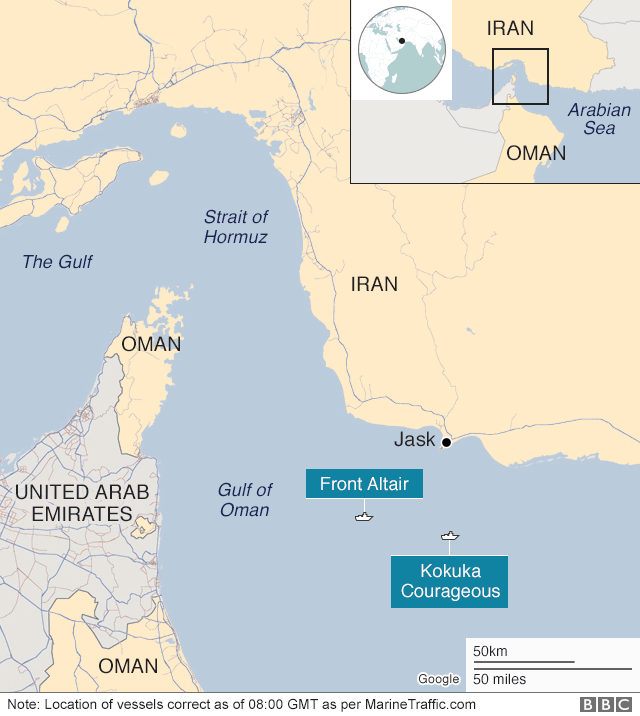

The ship's owner, Frontline, said the vessel was on fire - but denied reports in Iranian media that it had sunk.
The operator of the Kokuka Courageous, BSM Ship Management, said its crew abandoned ship and were rescued by a passing vessel.
Both Iran and the US have released pictures showing rescued crew members on board their vessels.
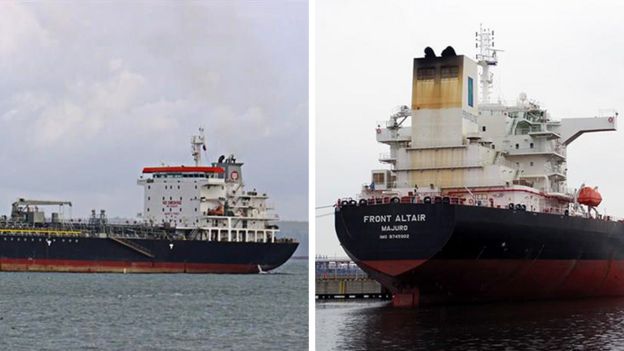 FREDERICK A TERRY/ARTJOM LOFITSKI
FREDERICK A TERRY/ARTJOM LOFITSKIWhy are US-Iran tensions so high?
In 2018, the US pulled out of the landmark nuclear deal reached in 2015 that was aimed at curbing Iran's nuclear activities.
The move was strongly criticised by a number of countries, including America's closest allies.
In May, President Donald Trump tightened US sanctions on Iran - mainly targeting its oil sector.
Iran then announced it was suspending some commitments under the nuclear deal.
In recent months the US has strengthened its forces in the Gulf - saying there was a danger of Iranian attacks.
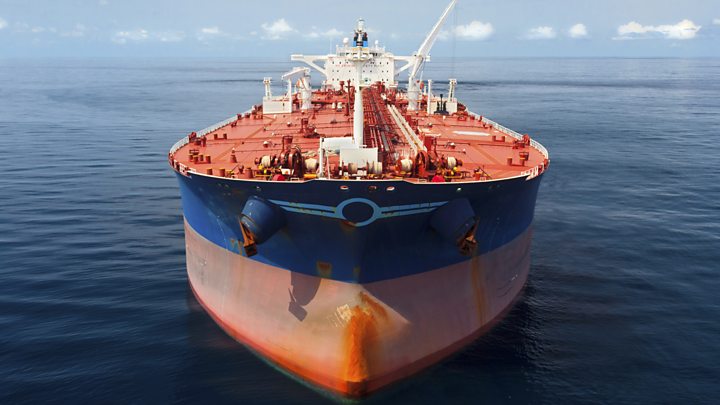
It has sent an aircraft carrier strike group and B-52 bombers to the region.
In response, Iran has accused the US of aggressive behaviour.
Those tensions rose markedly after the 12 May limpet mine attacks in the UAE.
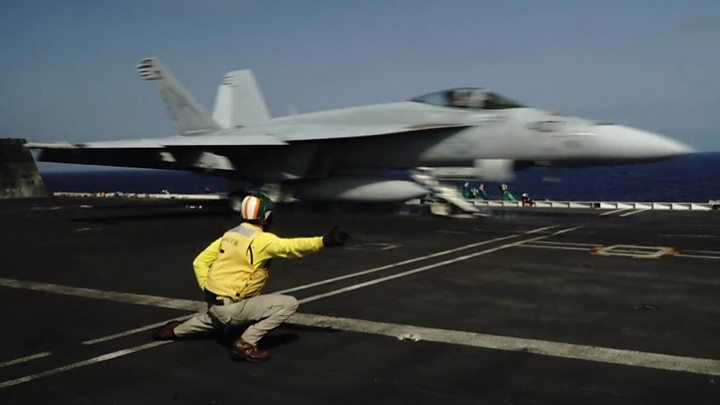
The US said that actor was Iran, an accusation Tehran has denied.

What is the US intelligence?
It is a pretty damning verdict from Mr Pompeo but as yet little detail has been given as to the exact nature of the intelligence and the extent to which a forensic analysis of the damage to the two tankers is backed up by other information - satellite or other tracking of the movements of any other vessels involved and so on.
Some may argue that there is a danger of a rush to judgement. And it is clear that if the US intends a response, especially a military one, then many countries - even friendly governments - will want to have chapter and verse on exactly what the US intelligence amounts to.
Iran, for its part, was quick to deny any involvement in the incidents. Indeed it sought to deflect blame by arguing in effect that it was being framed. "Somebody," an Iranian official asserted, "is trying to destabilise relations between Iran and the international community."
UN Secretary General António Guterres condemned Thursday's blasts.
He told the Security Council that the world cannot afford "a major confrontation in the Gulf region".
The UK's foreign secretary said it would conduct its own assessment, but the "starting point is obviously to believe our US allies".
Meanwhile, the EU called for "maximum restraint", while Russia said no-one should jump to conclusions or use the incident to put pressure on Iran, a Russian ally.
The incident is expected to be discussed at a closed-door meeting of the UN Security Council later on Thursday.
Paolo d'Amico, chairman of the tanker association, Intertanko, said the two vessels had been attacked, and expressed concern about dangers to other crews.
"If the waters are becoming unsafe, the [oil] supply to the entire Western world could be at risk," he said.
No comments:
Post a Comment
Note: Only a member of this blog may post a comment.